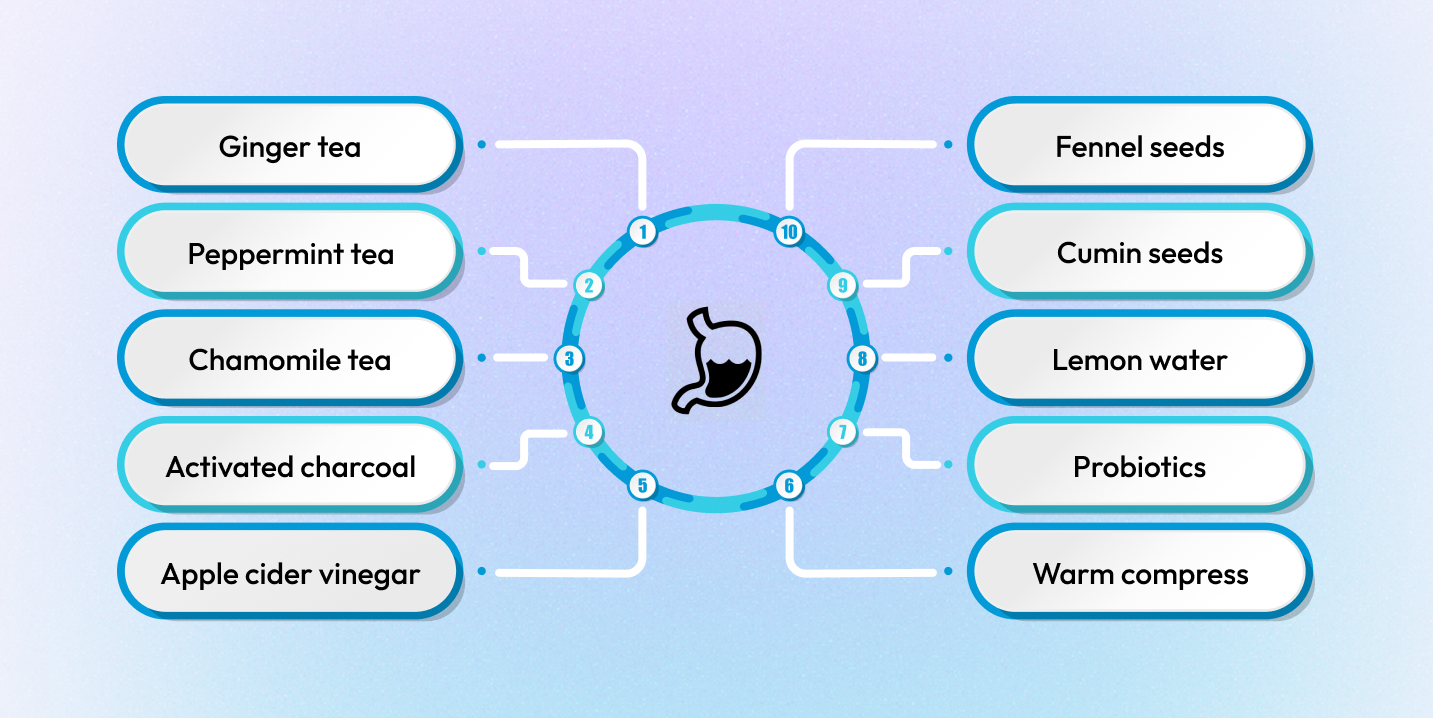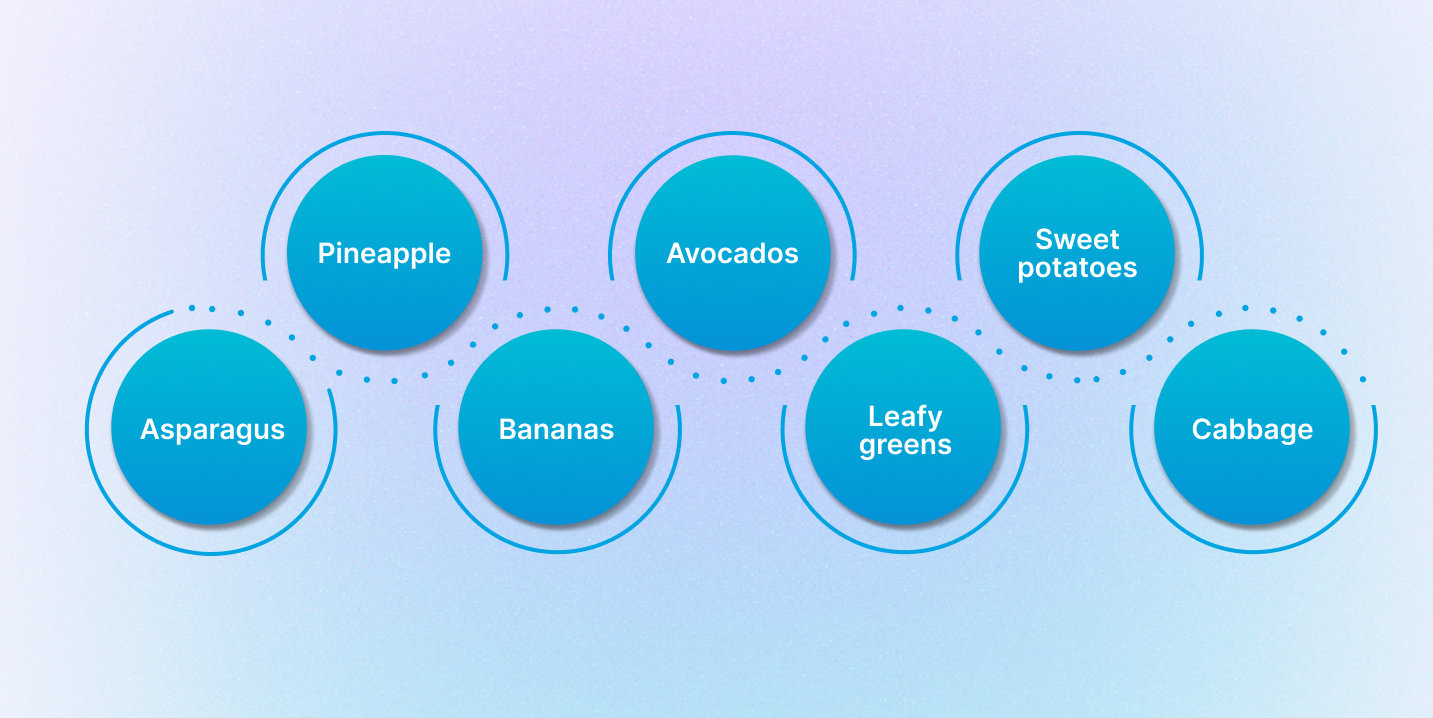Key takeaways
-
Digestive gas and flatulence can be caused by overeating, certain foods, food intolerances, stress, and digestive disorders
-
Remedies include ginger, peppermint, chamomile tea, activated charcoal, apple cider vinegar, fennel, cumin, and probiotics
-
Lifestyle changes like eating smaller meals, staying hydrated, exercising, and managing stress can reduce bloating and flatulence
-
Foods like asparagus, pineapple, bananas, and avocados support digestion and reduce bloating
-
Gut health is important for overall well-being; incorporate fiber, probiotics, and hydration to maintain a healthy digestive system
We've all been there: stomach cramps, bloating, and that uncomfortable feeling of gas building up after meals. It’s frustrating, right? You’re trying to enjoy your food, but instead, you end up feeling sluggish and self-conscious because of stomach gas, bloating or flatulence. If you’re tired of constantly asking, “Why do I feel so gassy?” you’re not alone. Digestive issues like gas and flatulence are more common than you think, and they can mess with your day and your confidence.
The good news is, these discomforts don’t have to take over your life. By making a few simple adjustments and incorporating natural remedies, you can easily manage and even reduce these issues.
In this blog, we’ll cover the causes of gas and flatulence, share some easy home remedies, and offer tips to help you feel more comfortable in your body. Ready to tackle those gas problems? Read on!
What causes digestive gas and flatulence?
Before we dive into remedies, it's important to understand what causes digestive gas and flatulence. Gas is a normal part of digestion, but when it becomes excessive, it can cause discomfort, bloating, and even embarrassment. This excess gas is often produced when undigested food ferments in your intestines or when you swallow air while eating or drinking.
Flatulence, commonly referred to as passing gas, is the release of air from the digestive system through the rectum. It is a natural bodily function, but excessive or uncomfortable flatulence can be a sign of digestive distress. Digestive gas is produced when food breaks down in the intestines or when air is swallowed during eating or drinking. This can result in bloating, cramping, and discomfort, affecting your day-to-day comfort and confidence.
Common causes include:
-
Quick or overeating: When you consume large meals or eat quickly, your stomach becomes overwhelmed, leading to gas buildup
-
Certain foods: Some foods are more likely to produce gas during digestion. Broccoli, Beans, onions, and dairy products are common culprits
-
Food intolerances: Lactose intolerance or gluten sensitivity are common issues that can lead to gas, bloating, and digestive discomfort
-
Carbonated drinks: Sodas and sparkling water can increase the amount of air swallowed, leading to bloating
-
Digestive disorders: Conditions like IBS, GERD, and SIBO can increase the likelihood of excess gas production
Understanding the reasons behind digestive discomfort helps you make better dietary and lifestyle choices to effectively manage gas and flatulence.
Home remedies for digestive gas relief

Gas and bloating can make you feel uncomfortable and self-conscious. By incorporating a few simple changes to your daily routine, you can reduce this discomfort and feel better.
Here are some effective home remedies:
-
Ginger tea
Ginger is a powerful root that has been used for centuries to soothe digestive discomfort. It helps soothe and calm the muscles in the digestive tract, easing gas and encouraging it to pass through the system more smoothly.
-
Peppermint tea
Known for its soothing and calming properties, peppermint tea relaxes the digestive muscles, easing gas and reducing bloating by allowing gas to pass through more easily.
-
Chamomile tea
Chamomile not only promotes relaxation but also reduces inflammation in the gut, helping to relieve bloating and indigestion. It has mild antispasmodic properties that relax the muscles of the digestive tract.
-
Activated charcoal
Activated charcoal can help absorb extra toxins and gas in the digestive system, providing quick relief from bloating and discomfort. It's commonly used for gas and bloating that may occur after eating certain foods.
-
Apple cider vinegar
Apple cider vinegar balances stomach acid levels, which can enhance digestion and reduce bloating. It can also help stimulate your digestive system and prevent indigestion.
-
Fennel seeds
Fennel seeds have carminative properties, which reduce gas and bloating by promoting the movement of gas through the digestive system. Fennel is also known to relieve indigestion and cramps.
-
Cumin seeds
Cumin is another herb that can aid digestion and reduce gas. It works by stimulating the production of digestive enzymes, which help break down food more effectively.
-
Lemon water
Drinking a glass of warm water with lemon juice first thing in the morning helps stimulate bile production and promotes smoother digestion. The acidity of lemon helps balance the stomach, preventing bloating and discomfort.
-
Probiotics
Probiotics are important bacteria that help maintain a healthy gut microbiome. They can improve digestion, reduce bloating, and prevent gas buildup. Foods like yoghurt, kefir, and sauerkraut are great sources of probiotics.
-
Warm compress
Applying a warm compress to your abdomen relaxes the muscles and alleviates bloating. The heat helps stimulate blood flow and aids in the breakdown of gas trapped in the digestive system.
Pro tip: Boil ginger, fennel, cumin, and cinnamon in warm water for a digestion-boosting drink. It helps with bloating, supports weight loss, and improves overall health. For best results, drink it first thing in the morning on an empty stomach.
These quick and simple remedies can make a huge difference in managing gas and bloating.
Lifestyle changes to manage flatulence
Along with home remedies, certain lifestyle changes can greatly reduce the occurrence of digestive gas and flatulence. These changes support better digestion and overall gut health, making you feel more comfortable day-to-day:
-
Eat smaller and frequent meals
Large meals can overload your digestive system, leading to bloating and gas. By eating smaller portions more often, you give your digestive system time to properly process food.
-
Chew your food thoroughly
Eating quickly or not chewing food properly can cause you to swallow air, which can lead to bloating and discomfort. Take your time, chew thoroughly, and avoid distractions like watching TV or talking while eating.
-
Stay hydrated
Drinking water helps to prevent constipation and supports digestion. Try to drink enough water throughout the day, but avoid drinking large amounts of liquid during meals, which may cause bloating.
-
Exercise regularly
Physical activity, even a simple walk after meals, can improve digestion and help move trapped gas through your intestines. Working out regularly helps with overall digestive health and prevents bloating.
-
Stress reduction
Stress can interfere with digestion, leading to gas and bloating. Try yoga techniques, such as deep breathing or meditation, which can help ease stress and improve digestion.
By adopting these habits, you’ll help your digestive system function better, preventing bloating and flatulence.
Foods that help reduce digestive gas

What you eat plays a major role in reducing digestive gas and bloating. By including certain foods in your diet, you can naturally support your digestive system and prevent discomfort. Here are some additional foods that can help alleviate digestive issues:
-
Asparagus
Packed with fiber and prebiotics, asparagus supports gut health by helping the growth of good bacteria. It also reduces bloating by acting as a natural diuretic, helping alleviate water retention.
-
Pineapple
Pineapple contains bromelain, an enzyme that helps break down proteins and aids digestion. Its anti-inflammatory properties also help to reduce bloating and ease digestive discomfort.
-
Bananas
Rich in potassium, bananas help regulate sodium levels in the body, reducing bloating from water retention. Their mild nature also helps soothe the stomach and support digestion.
-
Avocados
Avocados are loaded with healthy fats and fiber, both of which support digestion and help alleviate bloating. Their high potassium content also balances sodium levels, reducing water retention.
-
Leafy greens
Leafy greens like spinach, kale, and Swiss chard are high in fiber and water content, helping to promote smooth digestion and prevent bloating. They also contain magnesium, which can ease bloating and constipation.
-
Sweet potatoes
Sweet potatoes are rich in fiber and potassium, which help regulate digestion and reduce bloating. They also contain antioxidants that support gut health.
-
Cabbage
Cabbage, particularly fermented varieties like sauerkraut, is rich in probiotics that promote a healthy gut microbiome. Additionally, it contains fiber that supports digestion and helps prevent constipation.
These foods, combined with lifestyle changes and home remedies, can provide natural relief from gas and flatulence.
Also read: How Cucumber is Helpful in Gas & Bloating?
When to seek medical help
While bloating and gas are common issues, there are times when they could signal a more serious condition. If you experience any of the following symptoms, it’s important to consult a healthcare provider:
-
Persistent or severe bloating
-
Unexplained weight loss
-
Blood in stool or vomit
-
Intense abdominal pain
-
Frequent heartburn or acid reflux
If you experience any of these symptoms, seek medical advice for proper diagnosis and treatment.
Gut health and its importance
Your gut health plays a key role in overall well-being. A balanced gut is important for healthy digestion, strong immunity, mental clarity, and even healthy skin. An imbalance in your gut microbiome can cause issues like bloating, gas, flatulence and discomfort.
Long-term strategies for maintaining a healthy gut:
-
Eat a fiber-rich diet with whole foods to support gut health
-
Add probiotics to your diet to promote healthy gut bacteria
-
Stay hydrated to keep the digestive system running smoothly
-
Manage stress to prevent digestive slowdowns
Taking care of your gut is crucial for preventing bloating and supporting long-term digestion. Explore The Good Bug’s range of probiotic products to boost your gut health and reduce flatulence naturally.
To understand deeply how your gut microbiome impacts your overall health, check out this insightful video by Consultant Monique Jhingon: How Your Gut Microbiome Impacts Overall Health - Insights by Consultant Monique Jhingon
Digestive gas, bloating, and flatulence can cause discomfort and disrupt your day-to-day life, but with the right remedies and changes in your routine, you can find relief. By incorporating natural home remedies, paying attention to your eating habits, managing stress, and adding gut-friendly foods into your daily lifestyle, you can alleviate bloating and promote a healthier digestive system. Keep in mind that persistent symptoms may require professional guidance for a proper and accurate diagnosis and treatment.
Feeling ready to take charge of your digestive health? Start implementing some of these easy tips today and explore The Good Bug’s probiotics for an extra boost to your gut health.
Frequently asked questions (FAQs)
-
What causes constant bloating, and how can I stop it?
Bloating can be caused by overeating, food intolerances, stress, or digestive disorders. Managing your diet, staying hydrated, and using probiotics can help reduce bloating.
-
Can stress cause bloating?
Yes, stress can slow digestion, leading to bloating and discomfort. Try mindfulness techniques like deep breathing, yoga or calming exercises to reduce stress and ease bloating.
-
How can I tell if my bloating is related to a food intolerance?
Maintaining a food diary will help you identify foods that trigger bloating. Try eliminating suspect foods to see if your symptoms improve.
-
What food items do I avoid to prevent bloating?
Avoid high-FODMAP foods like beans, onions, and dairy. Carbonated drinks and processed foods can also trigger bloating in sensitive individuals.
-
How can I manage bloating at home?
Drink herbal teas, eat smaller meals, stay hydrated, and incorporate probiotics into your routine to help reduce bloating and improve digestion.


